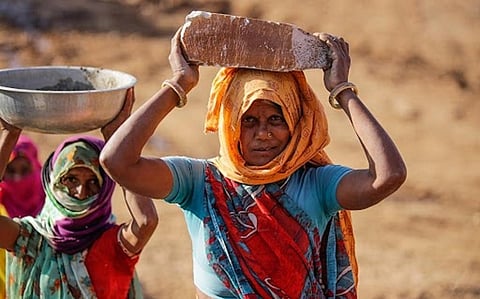

Workers in West Bengal seeking employment under the central government’s Mahatma Gandhi National Rural Employment Guarantee Act (MGNREGA) have lost Rs 3,891 crore- Rs 6,046 crore in wages, according to a new report.
The losses analysed by LibTech India, an action-research non-profit, for the year 2022 between April and December, found a stoppage of MGNREGA works in the state. Women workers lost wages amounting to Rs 1,870 crore-2,758 crore, noted the document released January 25, 2023.
Since December 21, 2021, the central government has withheld MGNREGA funds worth Rs 7,500 crore, citing ‘non-compliance of central government directives’. On the contrary, the act mandates that workers should receive payments within a fortnight after the completion of work.
The report holds significance as 10 per cent of the working households and 11 per cent of the active workers registered in the country belong to West Bengal, said Anuradha Talwar, co-ordinator with NREGA Sangharsh Morcha, West Bengal.
The state is a major contributor to the scheme and 100 per cent of the wage payments have been pending for over a year, she said.
“The loss in wages have been compared to how much the workers would have earned in the fiscal year between April and December 2022-23 if the employment generation continued at the pre-COVID-19 levels (April to December 2020-2021),” Talwar said, citing information procured from the government portal.
Workers have been experiencing stalled wages worth Rs 2,744 crore since December 26, 2021, she said.
During the investigation conducted over the past couple of years, it was observed that the non-payment of wages has directly affected their food security, she added.
“They often skipped meals due to unavailability of resources. Many took loans from private lenders or micro-finance institutions to sustain during the crisis,” said Talwar.
Another major finding from the study was that the demand for jobs dropped drastically compared to the COVID-19 years.
“The number of households working under the programme have reduced to 1.6 million during the latest financial year from 7.7 million during COVID-19 years. The number of workdays generated has also steeply declined to 37.3 million in financial year 2022-2023 from 320 million in COVID-19 years,” Talwar said.
Around 1.6 million workers who contributed 37.3 million workdays have not been paid.
Estimated MGNREGA wages amounting to Rs 6,046 crore from COVID-19 years and Rs 3,891 crore compared with pre-COVID-19 years have been lost due to the stoppage of work, Talwar said.
“If the employment generation would have continued to pre-COVID-19 levels, the workers would have earned Rs 4,687 crore more against what is due to them for work completed in current financial year. The income reduced by 83 per cent,” she said.
Compared with other communities, the loss in employment among Scheduled Castes was the highest at 91 per cent, amounting to Rs 1,669 crore in COVID-19 years.
No work was allotted in the financial year 2022-23, despite workers showing a willingness to work, Talwar said, quoting the study.
“Some people who received work, could avail it for six to 12 days. The unavailability of work has compelled the villagers to migrate in search of alternate employment,” she said.